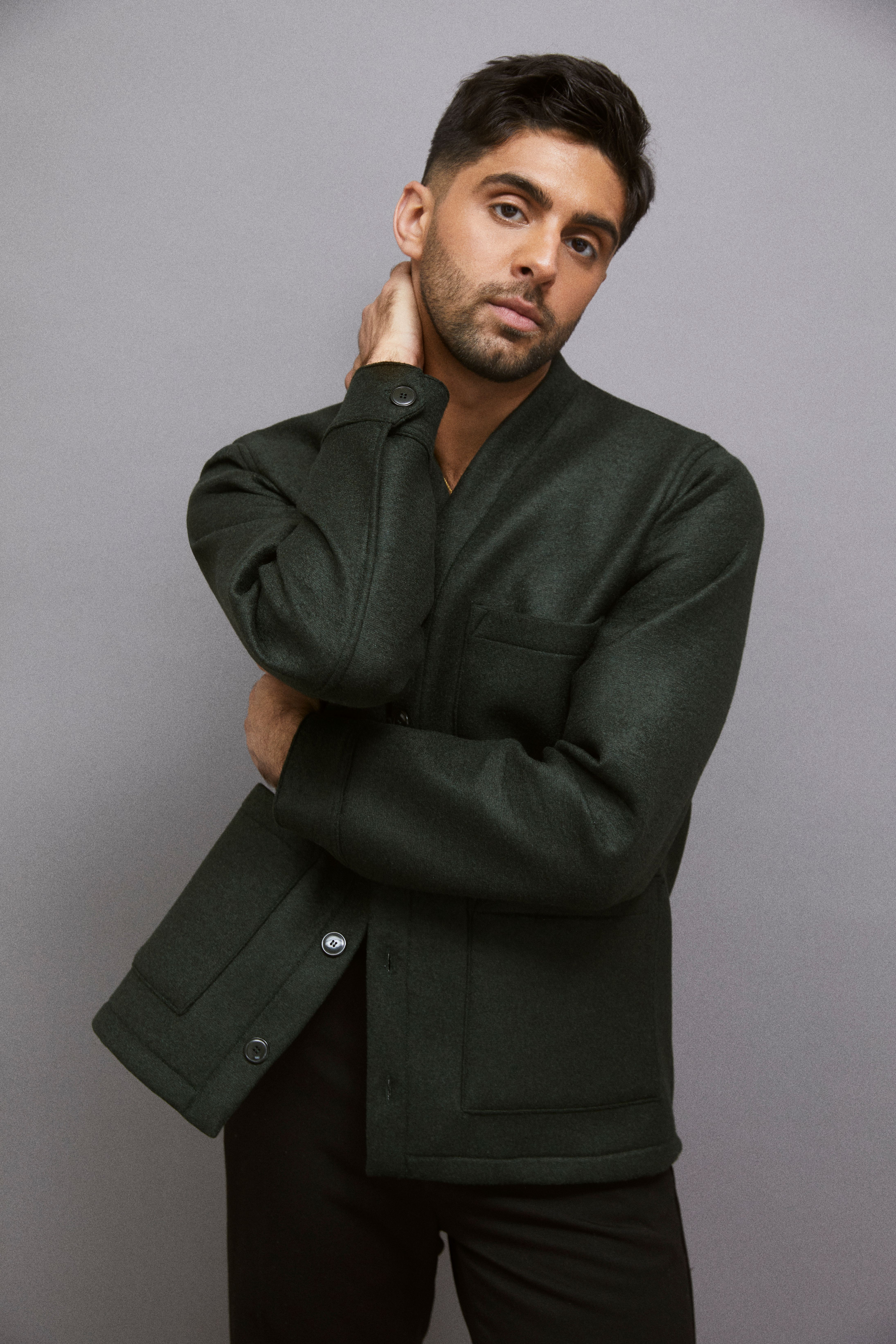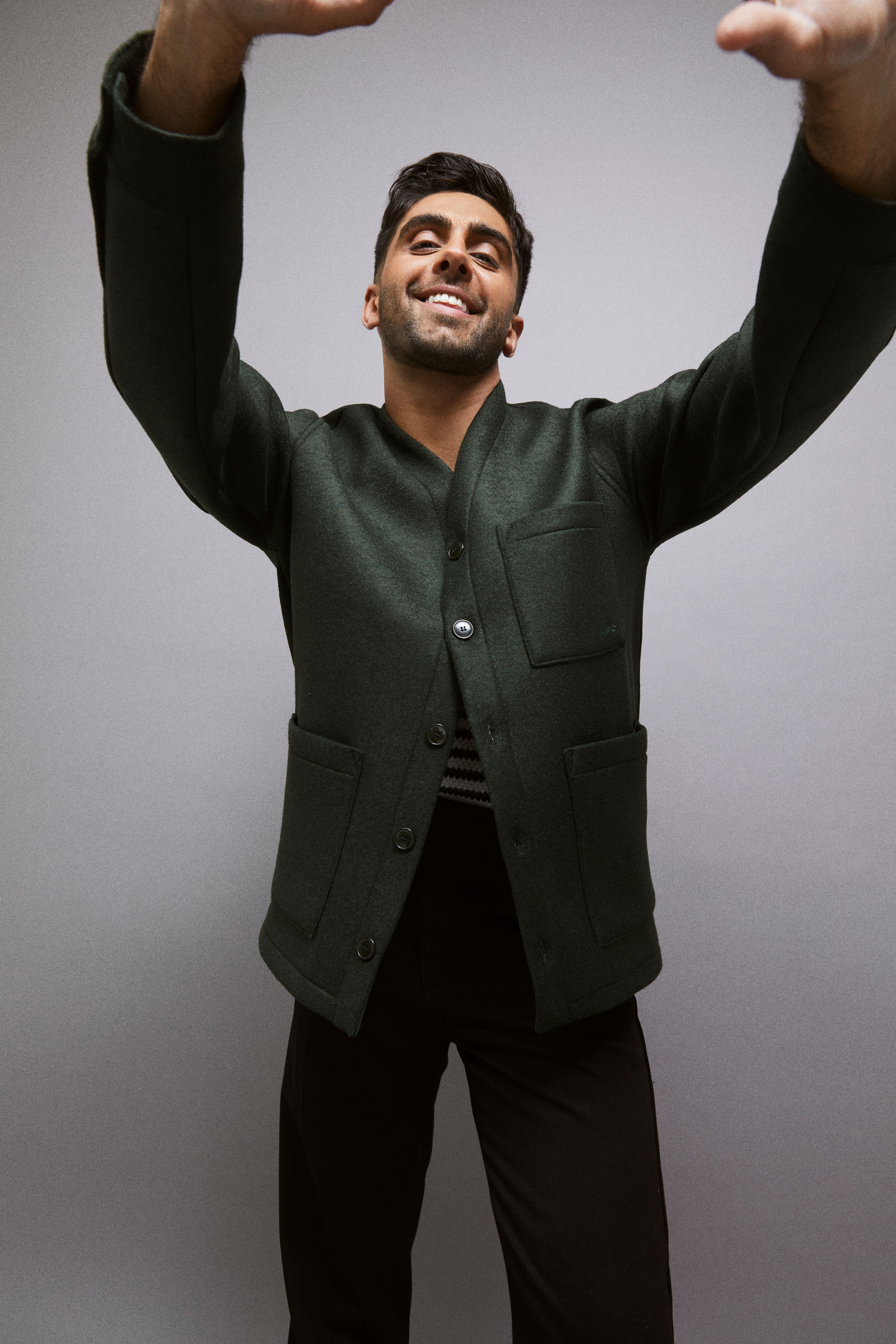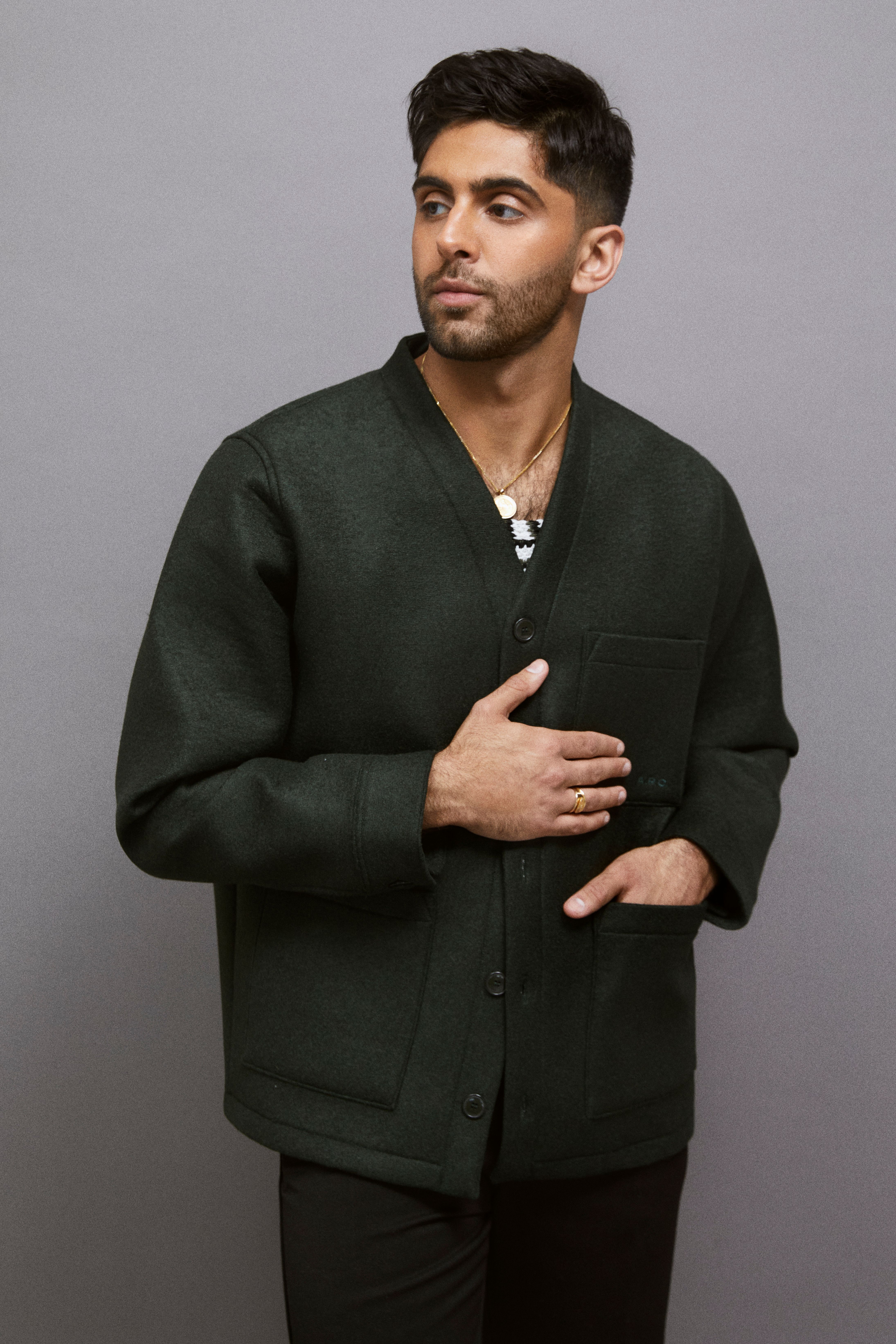
Arian Nik is an actor and social activist whose career path thus far has witnessed him take on roles that seek to challenge orthodoxies and stereotypes, not least playing the real-life presenter of Afghanistan’s version of MTV in the wake of the fall of the Taliban in the celebrated play Kabul Goes Pop. His latest lead role as a blood-sucking Muslim vampire in the atypical comedy Count Abdulla is no exception, forwarding a tongue-in-cheek take on individualism, and taking on the societal tropes that can so often constrict second generation British Muslims. In the show, he depicts a young horror-obsessed cinephile in the free-fall of an identity crisis – tight-rope walking a space between his religious family, his passion for b-movie splatter-fests, and his secular peers. It’s a situation that becomes increasingly untenable when he is bitten by a brassy cockney vampire, played by Jaime Winstone, and begins to undergo a rather bloody transformation. Here, the actor, who hails from Leeds, gives us an insight into his Iranian heritage, and tells us why the most important responsibility we have in a free society is to live our lives authentically.
You are known for your activism almost as much as you are for acting, and have been very outspoken about the current situation in Iran – what drives your activism?
Well, I've been born in a country where you can love who you want to love, and you can follow the career you want to follow – you can tell the stories you want to tell, and you can practice the religion you want to practice. Those are all huge privileges, so for me not to use my energy and the platform that I have would just be wrong. Iran has so much beauty to offer, but, right now, it’s home to a young demographic that are frighteningly at risk – if they're not being chased down for protesting, they're navigating a cost of living crisis while so many of those around them are spiralling into opioid addiction. And there are simply still so many people in Iran who don't know anything other than Islam and the rigidity in which they've been brought up. It’s really about convincing those people that the change that's happening isn't anti-Muslim, but that notion has been so deeply woven into the establishment narrative. It’s not an anti-Muslim movement, it's just defiantly pro-freedom, and it's about having the opportunity to choose. We have a responsibility to be making that point and engaging in difficult conversations because it’s the only way the culture can progress – the question is how best to introduce these ideas to a country, and the pockets of society who are still so conditioned.

How does your activism shape the kinds of roles you take on as an actor?
It sounds naff, but I care about people and the world, and how beautifully unique we all are, and I have realised that I need to make sure that the stories I tell are opening doors into the pockets of society that I care about. In the case of Count Abdulla, for example, it was so interesting to me what the notion of a vampire can mean in the Muslim community, because being a vampire could mean that you are gay, being a vampire could mean that you're trans, being a vampire could mean that you don't want to practice religion anymore, being a vampire could mean that you have fallen in love with someone who's Christian, and so on – within the rigidity that exists in factions of Muslim culture, all of those things can mean pretty much the same thing. This unusual protagonist, who is kind of performing being part of his community to keep his mum happy and because of his fear of being othered, is something that I could really relate to. And, if you think about it, we have no precursor for the notion of a Muslim vampire. Blood is clearly not halal! It flips everything. We were all so passionate on the show because we had an almost all global majority cast, so every single day we were like, we can't mess this up – we were fiercely determined to serve not only the story, but also the community.
You seem interested in busting stereotypes in your work. How important was the play Kabul Goes Pop in terms of defining your career path?
I haven't connected to a character so much before, ever. The play was based on a true story and it spoke of a struggle that still feels real, both in Afghanistan and in Iran. Shakeb and Shaima were the original hosts of what was kind of MTV for Afghanistan in the early 2000s, and I was getting to go on stage every night and have the privilege of sharing this incredibly powerful story with so many people from the community. That entire play was about being who you want to be, being true to the authenticity of who you are as a person, and taking the freedom to express that. My character, based on Shakeb, was playing artists like Britney Spears and Shakira to audiences in Afghanistan shortly after the Taliban fell in 2004, with his female anchor Shaima, who tragically disappeared after one year of presenting the show. They both did this incredible thing, and it crashed so quickly – neither of them could be who they wanted to be openly, and they were persecuted and punished. Being able to tell that story and have the privilege of sharing it with an audience, just made me go me, man, I need to live my own life authentically, and to the fullest I can for the people who just can't do that – it kind of set my intention, and made clear to me the path that I had to forge for myself.

Do you think you find your purpose in life, or create it?
I think it's a bit of both. I think that you have got to find what it is, and then create the space for it to happen. I knew very young that I was attracted to storytelling, but I also knew that there really wasn't much space for me to take that path. I had to create it, but creating it was really quite hard, because my parents wanted me very much to take a ‘real’ degree – they loved me and wanted me to have security and thrive, and not have to go through loops of self-doubt and anxiety that can come with a career in the arts. I totally understand that. I mean, it was just me and my mum until I was about six years old, really, and she had to navigate being an immigrant and a single mum before she met my stepdad – the stakes were really high, and we spent some of my early life in a Women’s Aid Hostel before receiving a council house in Meanwood, Leeds; she just didn’t want anything like that for me. When it came to going to drama school, there was resistance from her and my step dad, but my English teacher at the time was just wonderful, and she rallied with my sixth-form tutor and the head of drama, and they all came to my house, rang the doorbell and were like, he's really good at this and we need to talk about it because you can't shut it down. It had never been a career in my parents’ eyes, but when I was awarded a full scholarship that kind of shifted.
Given what has been happening in Iran, are you somebody who has hope for the future?
Yeah. I empathize with anyone who cannot live their most authentic self, and through the work I've done, and the stories I've been lucky enough to be able to tell, I've kind of freed myself from conditioning. I mean, I can see now that the things I would try and be into as a kid, or the conversations that I would try to have at school were all about blending in. And my parents did that for so long, too. It's only now that we are all kind of owning who we are a little bit more, and being like, no, it's fine to be different from the cultural doctrine, actually, because we're a new version of the culture – we’re the evolution of it. That's how cultures change. That's how they grow. That's how they evolve in their thinking and their philosophy, but also in their openness. I've been shooting up in Manchester for the past five months, which has given me the opportunity to go home to Leeds more often than I usually do. I have been deeply moved by how far the city has come in terms of its acceptance of queerness – not just the city itself, but also the readiness of my community to embrace ideas away from what they have been conditioned with. And I think the battle in Iran will absolutely be won, because this whole generation has been ignited by what has been happening, and there Is no going back. The frightening thing is that in Iran the execution rate has increased by 75 per cent since September last year. In May 2023 alone the country saw 142 executions. The only way that we get to the other side of that is to keep pushing, and to keep talking about it, and keep it present in people's consciousness. This movement is the bravest we have seen, and I know many of us won’t rest till Iran is free.
Count Abdulla premieres on ITVx on June 15
Photography by David Reiss